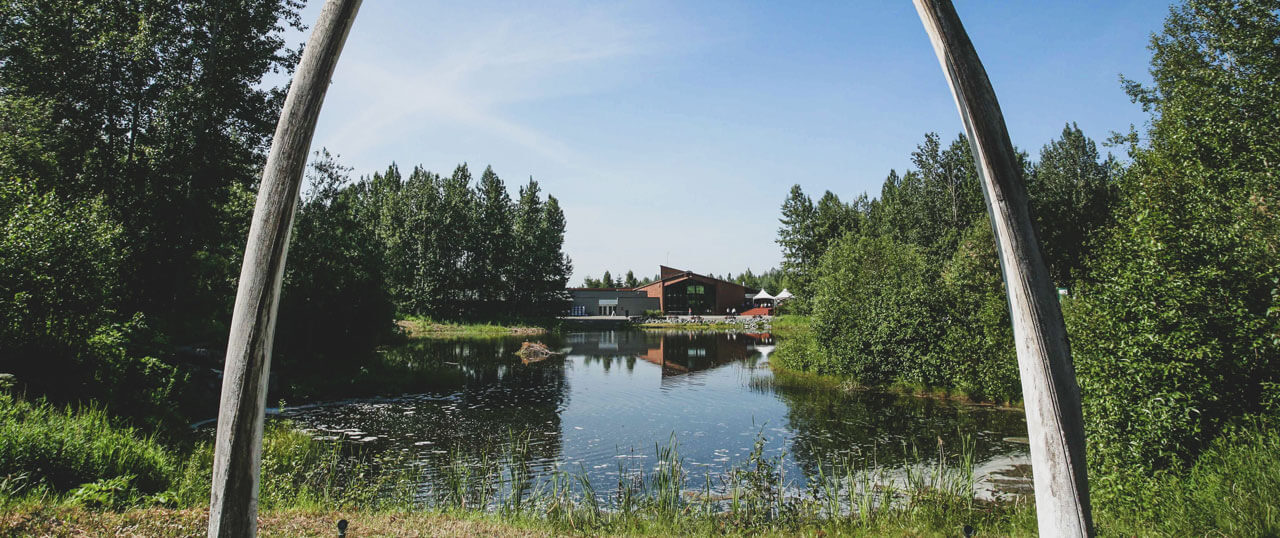By Robin Thompson, co-editor, Alaska Native Quarterly Magazine

Created by a unanimous vote at the Alaska Federation of Natives Convention in 1987, the Alaska Native Heritage Center (ANHC), a CIRI-affiliated nonprofit organization, is a long-standing educational and cultural institution. Located just beyond the gates of Joint Base Elmendorf-Richardson in Anchorage, ANHC serves Alaskans and tourists alike by sharing permanent Alaska Native collections and offering year-round programs.
“We would not have made it through this last year were it not for the support of our Alaska Native corporations (ANCs). I am incredibly proud of what they’ve done these last 50 years and I know if there’s one thing to be known about the Native community it’s that we are resilient; we’re stronger together,” ANHC President and CEO Emily Edenshaw said. “Looking ahead, there’s so much opportunity; there’s a lot of history that needs to be written and a huge untapped opportunity for cultural tourism.”
Since opening its doors to the public, ANHC has served more than 1 million visitors, including Alaska Native people of all ages and those who wish to learn about and connect with Alaska Native culture, heritage and traditions. ANHC also serves as a gathering and healing place for the Alaska Native community.
Like the majority of tourism-related activities in Alaska, ANHC suffered multi-million-dollar losses due to the COVID-19 pandemic, but it has remained in operation in large part due to grants and community partnerships.
“You can’t tell our history without talking about the partnership, involvement and close relationships with our ANCs,” Edenshaw said. “One of the things I’ve constantly been in awe of is that they have a social responsibility to our community. If you go to non-Native entities or corporations, you are not going to see burial services, funding for cultural tourism, internship programs that are really grounded in providing economic job opportunities, or grounded in culture and ways of life.”
The pandemic also allowed ANHC the opportunity to reimagine how the organization delivers programming to the public, including pivoting to online and virtual classes and creating cultural boxes sent out to K-12 students across the country.
“These boxes are really grounded in the mission and vision to connect our community to who they are as Indigenous peoples,” Edenshaw said. “Pre-COVID, the only way to experience the Heritage Center was to come here. I’m thankful that we were able to react immediately, where we’re just not in this constant state of crisis, and really start planning.”
Edenshaw had planned to disperse 250 cultural boxes as part of the program, but within days ANHC had received more than 2,000 online requests from across the country. Since then, the organization has partnered with ANCs and other entities—including Bristol Bay Native Corp., Calista Corp., CIRI and Cook Inlet Housing Authority—to deliver cultural education to students in both urban and rural areas.
“We’re building partnerships across the state and we’re working in ways we’ve never done before,” Edenshaw said. “It’s really allowed us an opportunity to bring the Heritage Center to our community versus our community having to come to the Heritage Center.”
Among the grants awarded to ANHC was an “America’s Cultural Treasures” initiative from the Ford Foundation that provides money to Asian, Black, Indigenous and Latinx arts and cultural organizations severely impacted by the COVID-19 pandemic. For its “vital contributions to the diversity of expression and excellence in America, despite historically limited resources and funding streams,” ANHC was one of 20 organizations selected for the prestigious award.
“Not only did it come with funding support, it also came with the opportunity to work in this incredible BIPOC (Black, Indigenous and People of Color) cohort organization,” Edenshaw said. “We get to be in a community and learn from them. For me, that is really inspiring.”
Over the next four years, ANHC will receive $3 million in general operating support to enhance and support its cultural, educational, and healing and the arts programs.
“We, as Indigenous people, know certain things to be true,” Edenshaw said. “We know our ancestors have been through a lot worse, and the truth is, we would not have gotten through this pandemic were it not for our partners.” For information, including the 2021 ANHC summer schedule, visit alaskanative.net.



